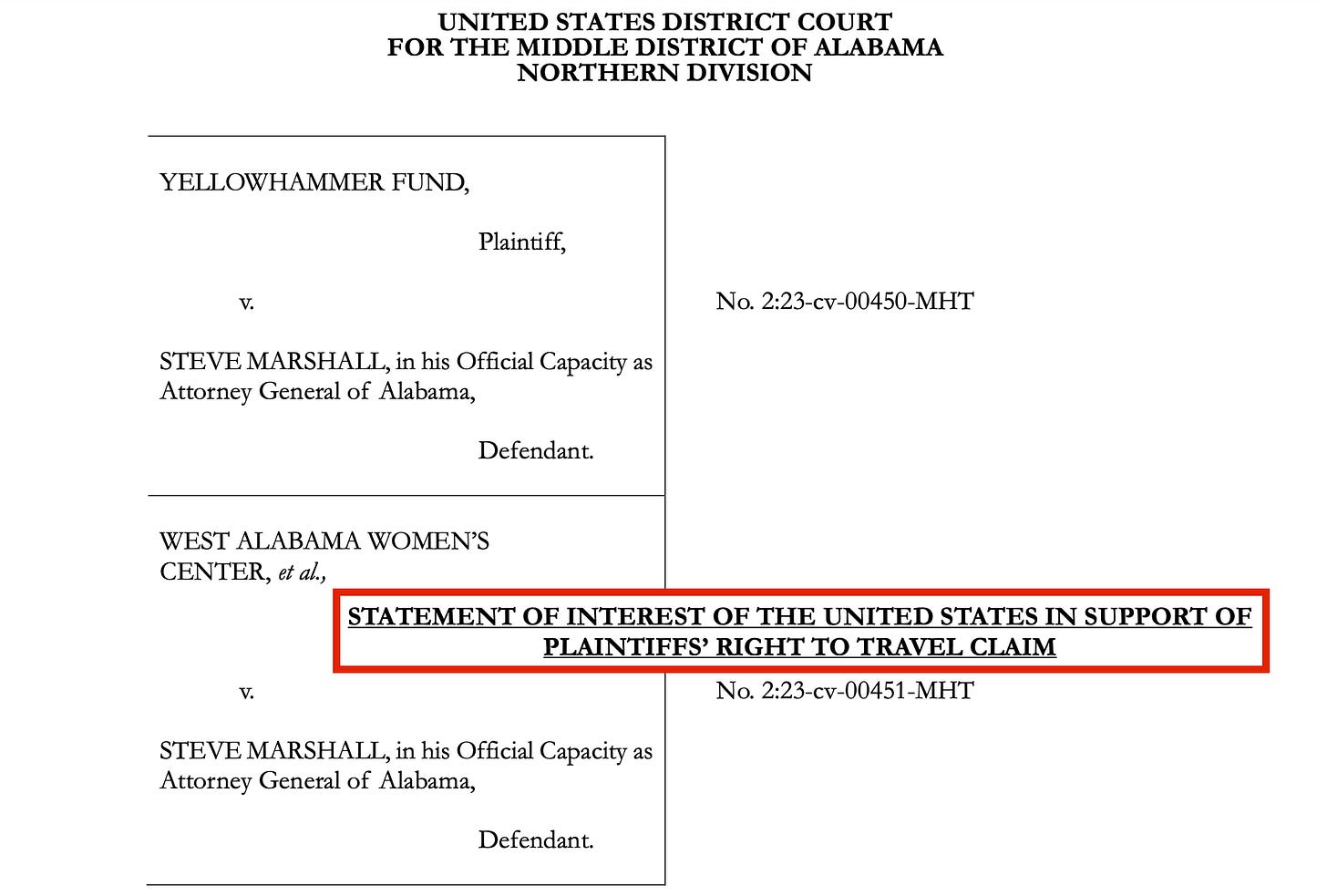DOJ says Alabama prosecutions for supporting out-of-state abortions would be unconstitutional
An important move from the Biden administration in an under-the-radar case. Also: Ohio Republicans say they want to ignore the voters after passage of Issue One.
Republican Alabama Attorney General Steve Marshall is currently fighting in court to defend his claimed right to prosecute people in Alabama who help other Alabamans seek an abortion elsewhere in a state where abortion is legal.
On Thursday, the U.S. Justice Department weighed in in the case “to prevent a breakdown in the federal system” that DOJ asserts would result if Marshall were to get his way.
“[T]he Alabama AG’s threatened prosecutions undermine … national interests by obstructing individuals’ exercise of their right to travel—one of the rights of national citizenship—and also by interfering with the legitimate policy judgments of other states,“ according to DOJ.
It’s an important move from the Biden administration in a case that could go from under-the-radar to front-and-center at any moment.
A women’s health clinic and abortion advocacy and education fund went to court after Marshall said that he would support such prosecutions once the Supreme Court’s decision in Dobbs v. Jackson Women’s Health Organization allowed for the state’s near-total abortion ban to go into effect. Marshall has defended the claims he made, arguing that the lawsuits should be dismissed because the state’s conspiracy law plainly could apply regarding violations of the abortion ban, thus allowing such prosecutions.
This is not a subtle or hidden argument. He’s come right out and said it. Here are the opening two paragraphs of his motion to dismiss the cases:
The State of Alabama prohibits most abortions. Unless an exception related to the health of the mother or child applies, it is a crime to perform an abortion in Alabama. Plaintiffs do not challenge the constitutionality of that prohibition.
Instead, they argue that because some other States allow such abortions, Plaintiffs have a right to conspire with others in Alabama to try to have abortions performed out of state. Plaintiffs are mistaken.
Later, in a section of the brief asserting that “[a]bortion’s legality in other States is immaterial,” Marshall argued:
Plaintiffs don’t appreciate that though abortion may be legal elsewhere, it is plainly illegal pursuant to Ala. Code § 13A-4-4 for Plaintiffs to conspire with others to procure abortions that would be illegal in Alabama. The criminal conduct is the agreement (the conspiracy) itself, which is conduct that occurs in Alabama that Alabama has every right to prosecute.
This is an extreme position taken by an extreme attorney general. It is also, by any fair reading of the law, unconstitutional.
As the Yellowhammer Fund argued in response:
Alabama’s Abortion Ban reaches only as far as its borders, and the Due Process Clause strictly forbids Defendant from applying Alabama laws outside of the state’s borders. Even if the conspiracy and accessory liability statutes could be read to criminalize out-of-state activities, Defendant cannot constitutionally prosecute, nor threaten to prosecute, out-of-state lawful conduct.
Now, DOJ has weighed in, with an appropriately aggressive brief:
The case is before Senior U.S. District Judge Myron H. Thompson, a Carter appointee.
Currently, the request is on Marshall’s motion to dismiss the case. If that is denied, the Yellowhammer Fund has filed a motion for summary judgment — asking Thompson to rule in its favor on the law.
While this case is of exceptional importance, in the larger legal context, it’s also important to see Marshall’s emerging role. He is one of the most extreme state attorneys general in a state where he knows his acts will be supported — or at least not strongly opposed — by voters.
Because he’s not the attorney general of a big state, though, he often is able to escape notice on the national political scene. He’s not, in other words, a high-profile AG in California, Florida, New York, or Texas. He’s not even in one of the other 10 largest states: Georgia, Illinois, Michigan, North Carolina, Ohio, and Pennsylvania.
He is, however, an attorney general with significant power in a rock-ribbed conservative state. He’s fought voting rights, trans rights, and — most recently — to keep innocent owners’ cars for extended periods of time under the state’s civil asset forfeiture law. He doesn’t draw the attention of a Ken Paxton filing — Texas’s recently-allowed-back-into-office-after-facing-an-impeachment-trial attorney general — but it can have the same effect of sending up far-right arguments and cases toward the Supreme Court.
Ohio shenanigans
I’ll have more on this moving forward, but, for now, be sure to read Jessica Valenti’s latest on the anti-democracy bullshit that Ohio Republicans are spewing after Tuesday’s Issue One vote passing a constitutional amendment that establishes protections for abortion and other reproductive rights in the Ohio Constitution.






Deeply concerned with reproductive justice and so have been following the Alabama lawsuits. Appreciate your break down of the motion to dismiss and the DOJ brief in response. Will continue to follow closely
In Dobbs, Kavanaugh assured us that:
"For example, may a State bar a resident of that State from traveling to another State to obtain an abortion? In my view, the answer is no based on the constitutional right to interstate travel."
To quote Justice Kagan, let's see if "some genius" found a way the Supreme Court majority will found around that.